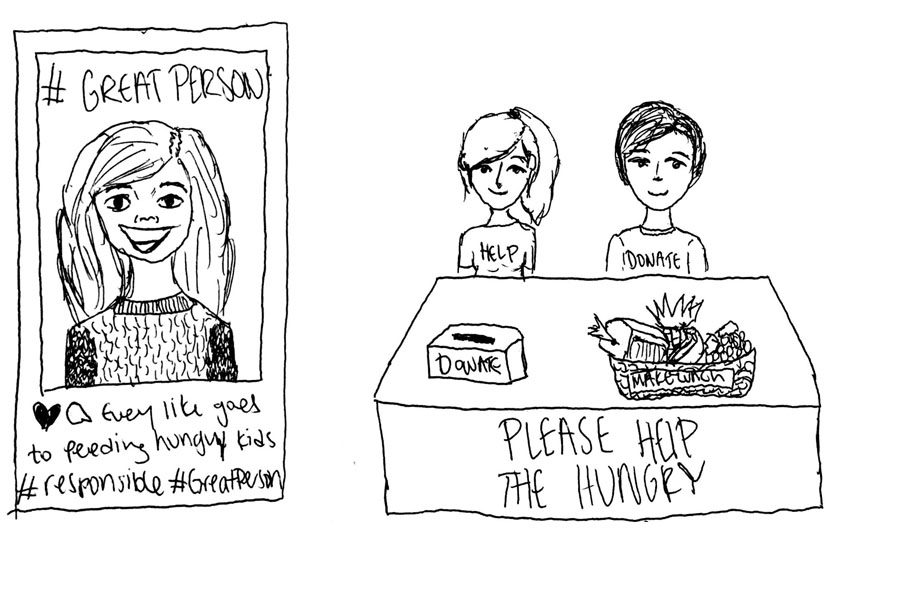Social Media Users Succumb to ‘Slacktivism’ Movement
December 12, 2017
‘While social media can sometimes produce social or political change by spreading word and raising awareness for a subject or movement, in many ways it has also bred a new generation of internet “slacktivists.”
Slacktivism is defined as “The practice of supporting a political or social cause by means such as social media or online petitions, characterized as involving very little effort or commitment,” according to the Oxford Dictionary.
Slacktivism provides a false sense of accomplishment, making people feel as if they are involved in a cause or in creating change when all they did was type a few words or click to like a post or page, rather than actually volunteering with an organization, donating money or getting involved in another way.
This problem stems from a desire to support a cause, but instead succumbing to laziness and an unwillingness to do the hard and tedious work that is often attached to taking political or social action, instead choosing to take the easy way out.
“Simply “likinga�� or sharing a status can make a person feel like they’ve done something, or even done enough,” said Andrea Sedlock, founder of a Gaithersburg-based nonprofit organization, Rukundo International. “The danger is this could easily lead to lessened participation in “real-life,a�� hands-on volunteer projects.”
While speaking up for an organization and raising awareness is always important, a serious problem arises when this social media posting begins to replace traditional volunteering and political activism.
There are many instances in which internet activism can lead to awareness being raised about an act of injustice or a problematic action committed by a popular company or media source, and there can be great value in sharing knowledge and opinions with like-minded individuals through social media.
However, this is often fleeting, and soon enough the buzz about a topic dies out and is replaced by something else.
Simply “likinga�� or sharing a status can make a person feel like they’ve done something, or even done enough
— Andrea SedlockBecause of this, it is extremely hard to tell how effective social media activism really is in making a point, especially one with a lasting impact on society.
For instance, social media users were quick to call for a boycott of different brands, such as Uber, Starbucks and Budweiser, around the time of Trump’s election depending on the brand’s political stance and how outspoken they were about it.
However, none of these brands were seriously hurt by the hashtags opposing them, and all seem to be thriving now, bringing up the question of if these boycotts were really boycotts at all.
Slacktivism is more prevalent than ever in the age of social media and smartphones as people flock to online sites, inevitably seeing these posts.
According to an April 2017 CBS 60 Minutes report, many social media apps are actually designed to have somewhat addictive properties, making people want to come back to the app repeatedly.
As people are spending more time on their phones, they are inevitably seeing more trending hashtags and slacktivist movements, increasing the appeal to fall victim to slacktivism without even meaning to.
Social media movements can bring awareness to a lesser-known cause. However, reading about a cause online or quickly writing a post to express thoughts and prayers does not equate to actually investing time and money to a cause by volunteering or donating.
The solution to slacktivism and its appeal on social media sites is simple: put down the phone and sign up to volunteer.
While it may seem convenient and exciting to show support for many different causes with a simple post, it is more rewarding to find one or two political movements or volunteer organizations to devote time and effort to.
Junior Leo Wagner is passionate about urban planning, and as a result of that is an involved member of his neighborhood’s civic association, as well as the Montgomery County Transit Advisory Board, and frequently attends meetings of both.
“Every voice, everyone who’s actually trying to actually do something is helping the cause, but if you’re not trying to do something, how are you really helping?” Wagner said. “You make yourself feel better, you make yourself think that you’re helping, instead of actually doing something real.”
If students really want to create change, the first change they can make is putting down their phones, logging off of social media and getting involved in the community by donating time and effort to an important cause.





